Overview
The Euro-Currency Standing Committee (ECSC) was established by a decision of the BIS Governors at their meeting of April 1971. [1] : 3 It adopted its current name in February 1999, as the word euro had taken a new meaning as the European single currency. [2]
The CGFS reports to the BIS Global Economy Meeting. It helps member central banks to assess stability risks in financial markets on a global scale, and coordinates the ongoing development of the BIS' international banking and financial market statistics. [3] It has been described by economist Charles Goodhart as the "premier macro-economic forum for the discussion of international tensions / imbalances". [1] : 465
As of 2024, the CGFS had 28 members: Central Bank of Argentina, Reserve Bank of Australia, National Bank of Belgium, Central Bank of Brazil, Bank of Canada, People's Bank of China, European Central Bank, Bank of France, Deutsche Bundesbank, Hong Kong Monetary Authority, Reserve Bank of India, Bank of Italy, Bank of Japan, Bank of Korea, Central Bank of Luxembourg, Bank of Mexico, De Nederlandsche Bank, Central Bank of Russia, Saudi Central Bank, Monetary Authority of Singapore, South African Reserve Bank, Bank of Spain, Sveriges Riksbank, Swiss National Bank, Bank of Thailand, Bank of England, Board of Governors of the Federal Reserve System, and Federal Reserve Bank of New York. [4]

A central bank, reserve bank, or monetary authority is an institution that manages the currency and monetary policy of a country or monetary union. In contrast to a commercial bank, a central bank possesses a monopoly on increasing the monetary base. Many central banks also have supervisory or regulatory powers to ensure the stability of commercial banks in their jurisdiction, to prevent bank runs, and in some cases also to enforce policies on financial consumer protection and against bank fraud, money laundering, or terrorism financing.
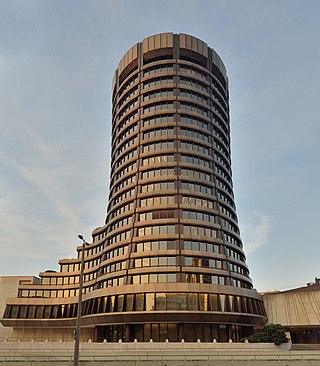
The Bank for International Settlements (BIS) is an international financial institution which is owned by member central banks. Its primary goal is to foster international monetary and financial cooperation while serving as a bank for central banks. With its establishment in 1929, its initial purpose was to oversee the settlement of World War I war reparations.

The global financial system is the worldwide framework of legal agreements, institutions, and both formal and informal economic action that together facilitate international flows of financial capital for purposes of investment and trade financing. Since emerging in the late 19th century during the first modern wave of economic globalization, its evolution is marked by the establishment of central banks, multilateral treaties, and intergovernmental organizations aimed at improving the transparency, regulation, and effectiveness of international markets. In the late 1800s, world migration and communication technology facilitated unprecedented growth in international trade and investment. At the onset of World War I, trade contracted as foreign exchange markets became paralyzed by money market illiquidity. Countries sought to defend against external shocks with protectionist policies and trade virtually halted by 1933, worsening the effects of the global Great Depression until a series of reciprocal trade agreements slowly reduced tariffs worldwide. Efforts to revamp the international monetary system after World War II improved exchange rate stability, fostering record growth in global finance.

The Deutsche Bundesbank is the German member of the Eurosystem and has been the monetary authority for Germany from 1957 to 1998, issuing the Deutsche Mark (DM). It succeeded the Bank deutscher Länder, which had introduced the DM on 20 June 1948.
In monetary economics, the money multiplier is the ratio of the money supply to the monetary base. If the money multiplier is stable, it implies that the central bank can control the money supply by determining the monetary base.
Basel II is the second of the Basel Accords, which are recommendations on banking laws and regulations issued by the Basel Committee on Banking Supervision. It is now extended and partially superseded by Basel III.

The Basel Committee on Banking Supervision (BCBS) is a committee of banking supervisory authorities that was established by the central bank governors of the Group of Ten (G10) countries in 1974. The committee expanded its membership in 2009 and then again in 2014. As of 2019, the BCBS has 45 members from 28 jurisdictions, consisting of central banks and authorities with responsibility of banking regulation.
Tier 1 capital is the core measure of a bank's financial strength from a regulator's point of view. It is composed of core capital, which consists primarily of common stock and disclosed reserves, but may also include non-redeemable non-cumulative preferred stock. The Basel Committee also observed that banks have used innovative instruments over the years to generate Tier 1 capital; these are subject to stringent conditions and are limited to a maximum of 15% of total Tier 1 capital. This part of the Tier 1 capital will be phased out during the implementation of Basel III.
A currency crisis is a type of financial crisis, and is often associated with a real economic crisis. A currency crisis raises the probability of a banking crisis or a default crisis. During a currency crisis the value of foreign denominated debt will rise drastically relative to the declining value of the home currency. Generally doubt exists as to whether a country's central bank has sufficient foreign exchange reserves to maintain the country's fixed exchange rate, if it has any.
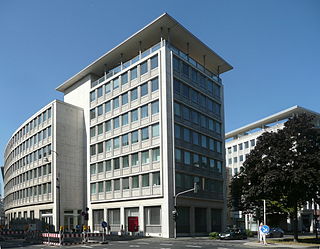
Herstatt Bank was a privately owned bank in the German city of Cologne. It went bankrupt on 26 June 1974, an event widely referred to as the Herstatt crisis. Herstatt's failure specifically highlighted the importance of settlement risk in foreign-exchange markets, which became correspondingly known as Herstatt risk.

Axel Alfred Weber is a German economist, professor, and banker. He is currently a board member and chairman of Swiss investment bank and financial services company, UBS Group AG, and has announced his resignation effective 7 April 2022.

Hans Tietmeyer was a German economist and regarded as one of the foremost experts on international financial matters. He was president of Deutsche Bundesbank from 1993 until 1999 and remained afterwards one of the most important figures in finance of the European Union.
Sir Paul Tucker is a British economist, central banker, and author. He was formerly the Deputy Governor of the Bank of England, with responsibility for financial stability, and served on the Bank's Monetary Policy Committee from June 2002 until October 2013 and its interim and then full Financial Policy Committee from June 2011. In November 2012 he was turned down for the position of governor in favour of Mark Carney. In June 2013, Tucker announced that he would leave the Bank of England, and later that he would be moving to Harvard. He was knighted in the 2014 New Year Honours for services to central banking. His first book, Unelected Power, was published in May 2018 and his second book, Global Discord was published in November 2022.
Malcolm D. Knight is a Canadian economist, policymaker and banker. He is currently Visiting Professor of Finance at the London School of Economics and Political Science and a Distinguished Fellow at the Center for International Governance Innovation. From 2008 to 2012, Knight was Vice Chairman of Deutsche Bank Group where he was responsible for developing and coordinating the bank's global approach to issues in financial regulation, supervision, and financial stability. He served as general manager of the Bank for International Settlements from 2003 to 2008 and as Senior Deputy Governor of the Bank of Canada (1999-2003), after holding senior positions at the International Monetary Fund (1975-1999).
Macroprudential regulation is the approach to financial regulation that aims to mitigate risk to the financial system as a whole. In the aftermath of the late-2000s financial crisis, there is a growing consensus among policymakers and economic researchers about the need to re-orient the regulatory framework towards a macroprudential perspective.

The International Association of Deposit Insurers (IADI) was formed on 6 May 2002 with the purpose of sharing deposit insurance expertise with the world and contributing to the stability of financial systems as the standard setter for deposit insurance with a global and expanding membership.
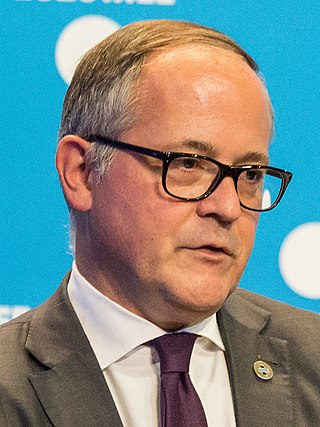
Benoît Georges Cœuré is a French economist who has been serving as President of the Autorité de la concurence since 2022. He previously served as a member of the Executive Board of the European Central Bank from 2012 to 2019.
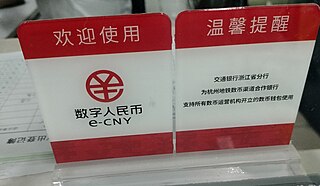
A central bank digital currency is a digital currency issued by a central bank, rather than by a commercial bank. It is also a liability of the central bank and denominated in the sovereign currency, as is the case with physical banknotes and coins.
Joachim Nagel is a German economist who has been serving as President of the Bundesbank since 2022. Before he was a senior manager of the Bank for International Settlements since 2020, having been a member of the board of the Deutsche Bundesbank from 2010 to 2016 and then a member of the board of the KfW Bankengruppe from 2017 to 2020. He was appointed President of the Deutsche Bundesbank on 1 January 2022, succeeding Jens Weidmann who resigned.
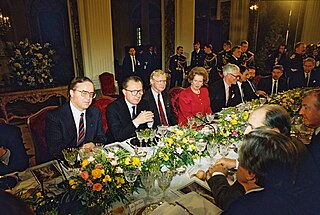
The Delors Committee, formally known as the Committee for the Study of Economic and Monetary Union, was an ad hoc committee chaired by European Commission President Jacques Delors in 1988–1989. It was set up in June 1988 upon a mandate from the European Council to examine and propose concrete stages leading to European Economic and Monetary Union; its report, commonly known as the Delors Report, was published in April 1989.










